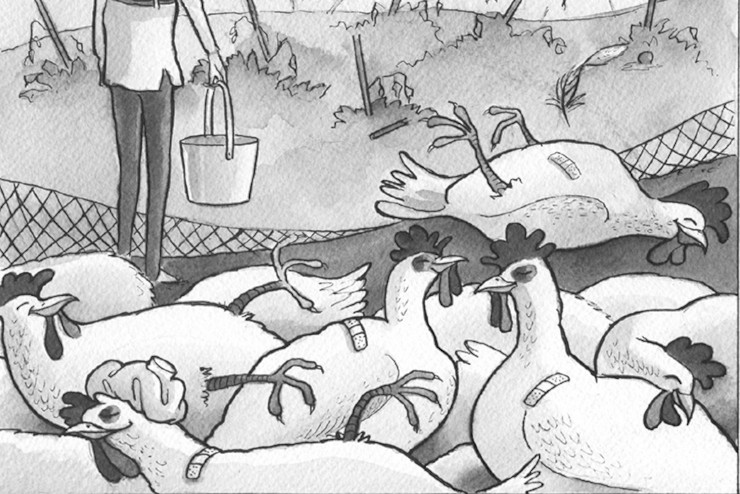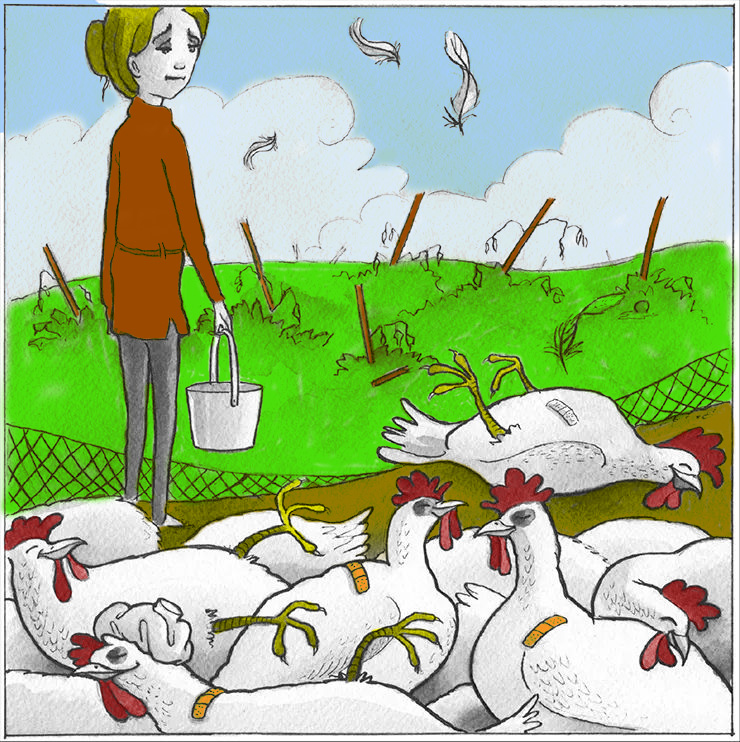
I often save some of my produce for the local wildlife. I imagine they will eat from my garden one way or the other, so I might as well give them some of the fruits and vegetables that get eaten by bugs or that don’t develop. I try to keep this offerings a little distance from my garden, but I’ve put out corn for deer, cucumbers for rabbits, and strawberries for skunks. But tomatoes for chickens?
Chickens may not be the brightest animals in the yard, but when it comes to saving your bad tomatoes for chickens, they are smarter than they let on. At least, that’s the impression I get from reading today’s story.
In Chicken Tomatoes, writer Amber Kanuckel finds out the hard way that chickens not only like tomatoes, but will gladly ruin your entire stand of tomatoes if given the chance. She writes, “One fine morning I was walking through my gardens, sipping coffee, when I came upon a scene of unimaginable destruction.”
In comical detail, Amber describes the complete destruction of her stand of 30 tomato plants. She finds her flock of chickens “lying around in the grass. Some had one leg kicked out so that they leaned lazily to one side. Others lay with their wings loosely hanging by their sides, beaks resting against the ground.”
Did they become chicken soup? Did they live happily ever after? Did they destroy the rest of the garden? Or, perhaps, something more dastardly? I’ll leave it to Amber to share the story.
Gardens Can Be the Source of Some of the Funniest Stories
This story comes from our archive that spans over 30 years and includes more than 130 magazine issues of GreenPrints. I love pieces like these that turn stories into comical moments of laughter, and I hope you enjoy this story as well.

Chicken Tomatoes
Two things you don’t want to put together.
By Amber Kanuckel
I love to grow tomatoes. There’s nothing like home-canned sauce, so each year I grow at least 30 tomato plants. For a number of years, I also raised chickens so that I could stock the fridge—and the neighbors’ fridges—with fresh eggs.
For a few summers, the chickens and tomatoes got along just fine (i.e., their paths never crossed). But one summer I decided to treat the chickens. On this particular day, the tomato harvest wasn’t going so well. Between the slugs and the unusually wet weather, I had enough defective ones to fill a small bucket.
As I carried that bucket of bad tomatoes to the compost pile, I wondered if the chickens might like to eat some. When I passed the chicken yard, I tossed a few over the fence, just to see what happened. Some of the hens came over to investigate, and a couple of them pecked at the tomatoes in a desultory fashion. I shrugged and turned towards the compost pile.
I hadn’t gone but a few steps when I heard the most terrible racket. I turned and was greeted by the sight of a flock of hens that had gone completely mad.
It turns out that chickens do like tomatoes—and I mean they really like them. As I watched, one hen grabbed a tomato scrap and ran across the yard, neck and wings outstretched. Three more hens pursued her with evil in their eyes. Two hens crouched in a corner over a fallen tomato, raising their hackle feathers at each other. Other hens cackled triumphantly over their tomatoes, and the poor rooster stood in the middle of the yard, scratching the ground furiously while crowing as loud as he could.
Amused, I threw a few more tomatoes over the fence and watched as the chickens scrambled and gobbled. Before too long, my bucket of bad tomatoes was empty and the hens were settling down around the yard, tired and satisfied.

Those tomatoes made the chickens so happy that I made sure to feed them at least a few tomatoes each day, even if I only had green ones. Each batch of tomatoes caused just as much mayhem as the last. I’d lean on the fence and chuckle at the hens’ antics, sometimes calling my husband over to watch.
He was less amused. In his opinion, I was enabling a tomato addiction, and he said, repeatedly, that sooner or later I was going to regret it. I brushed off his concerns. Chickens, while adorable and often amusing, are not noted for their intelligence. I refused to believe that feeding them a few tomatoes each day would lead to the ruin of my tomato bed.
But that is exactly what happened. One fine morning I was walking through my gardens, sipping coffee, when I came upon a scene of unimaginable destruction. As I later found, something had torn a hole in the fence around the chicken yard—a raccoon, most likely—and the chickens had gotten out.
Those chickens had ignored every part of the vegetable garden but the tomatoes—and the tomatoes were a sad sight. Vines trailed where they had been torn down from their cages, and a few of the cages lay on their sides on the ground. The wooden stakes I’d used to support the back line of tomatoes now leaned at crazy angles, reminding me of the headstones in some forgotten cemetery.
There wasn’t a single tomato left—not even a green one.
Back at the chicken yard, a dozen of the happiest, fattest chickens you’ve ever seen were lying around in the grass. Some had one leg kicked out so that they leaned lazily to one side. Others lay with their wings loosely hanging by their sides, beaks resting against the ground. Only the rooster cocked an eye as I approached, and when he saw it was only me, he ruffled his feathers and went back to sleep.
Cursing my foul—OK, fowl—fate, I silently fixed the hole in the chicken fence. I devoted the rest of the day to salvaging the tomato bed: clearing away fallen branches, pruning broken stems, righting stakes and cages, and tying up the plants so they once again stood upright.
The chickens were forced to quit their tomato habit cold turkey. I assumed that after a week or two, they would forget about tomatoes entirely.
For the second time that summer, I was wrong.
One day, about two weeks after the Great Tomato Massacre, as my husband had taken to calling it, I went out to the chicken yard to feed and gather eggs. When I arrived, I found a tree limb lying on the fence. There wasn’t a single chicken in sight. I rushed to the tomato bed, but the chickens weren’t there, either. Apparently, they had flown the coop in search of something better than the few tiny green tomatoes that had grown back in my garden.
I went back to the chicken yard, cleared away the tree limb, and repaired the fence. Then I gathered eggs and put down feed. Over the years I’ve learned there is nothing so pointless as chasing chickens, so on my way out of the yard, I left the gate open. I knew that toward evening, no matter where they’d gone, they’d come home to roost, and I could just close the gate behind them.
Sure enough, they did, and I did.
As the days went by, I didn’t think much about where the chickens had gone or what they had done. The important thing was that they had all come home safely, and they had done it without finishing off my poor tomato plants.
Then, on a hot late-summer afternoon, I was out on the property line, inspecting the fence and clearing brush. My neighbor, Eugene, spotted me and came over to chat. We talked about weather and neighborhood happenings, but the subject—as it invariably does among country gardeners—eventually turned to tomatoes.
“A couple of weeks ago,” Eugene said, “the strangest thing happened to my tomato plants. They were all just torn to bits. There wasn’t a tomato left any place.”
Oh no, I thought. I did my best to look concerned as Eugene recounted the horrors inflicted upon his tomatoes.
“I dunno what coulda done it,” he added. “Don’t have a clue, really. But I thought you should know so you can keep an eye out.”
“I’ll do that,” I replied with a weak smile. We talked a while longer, but my heart was no longer in the conversation. I made a polite exit, picked up my tools, and headed home. I was halfway there when I heard the chickens cackling loudly. I couldn’t help but think they were doing it on purpose, just for me.
Am I ever going to let a chicken get near a tomato again?
Only if they’re both in a casserole. ❖
By Amber Kanuckel, published originally in 2015, in GreenPrints Issue #103. Illustrated by Dena Seiferling

Do you have any stories about tomatoes for chickens that you would share?




Hilarious!
It sounds like those chickens were very intoxicated by maybe fermented tomatoes? My gran made wine from fermented grapes one day and asked my mother to throw the spent grapes away. Instead, she put them in the chicken house and all of their hens got blasting drunk.
One of the funniest stories ever for Greenprints! Very well-written!
Chicken/ tomato story… hilarious!